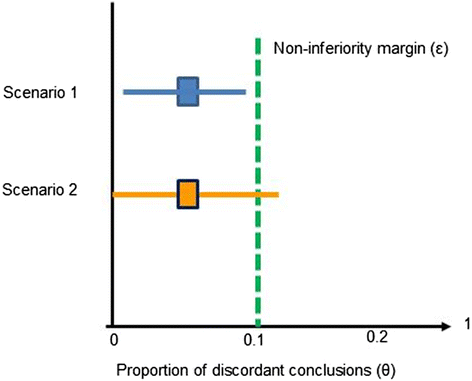Assessing the validity of abbreviated literature searches for rapid reviews: protocol of a non-inferiority and meta-epidemiologic study
- PMID: 27876092
- PMCID: PMC5120483
- DOI: 10.1186/s13643-016-0380-8
Assessing the validity of abbreviated literature searches for rapid reviews: protocol of a non-inferiority and meta-epidemiologic study
Abstract
Background: Systematic reviews offer the most reliable and valid support for health policy decision-making, patient information, and guideline development. However, they are labor intensive and frequently take longer than 1 year to complete. Consequently, they often do not meet the needs of those who need to make decisions quickly. Rapid reviews have therefore become a pragmatic alternative to systematic reviews. They are knowledge syntheses that abbreviate certain methodological aspects of systematic reviews to produce information more quickly. Methodological shortcuts often take place in literature identification. A potential drawback is less reliable results. To date, the impact of abbreviated searches on estimates of treatment effects and subsequent conclusions has not been analyzed systematically across multiple bodies of evidence. We aim to answer the research question: Do bodies of evidence that are based on abbreviated literature searches lead to different conclusions about benefits and harms of interventions compared with bodies of evidence that are based on comprehensive, systematic literature searches?
Methods: We will use a non-inferiority and meta-epidemiologic design. The primary outcome is the proportion of discordant conclusions based on different search approaches. Drawing of a pool of Cochrane reports published between 2012 and 2016, we will randomly select 60 reports. Eligible reports are those that present a summary-of-findings table, draw a clear conclusion, present data for meta-analyses, and document the search strategy clearly. We will conduct several abbreviated searches to detect whether included studies in these Cochrane reviews could be detected. If searches could not detect all studies, we will revise the original summary-of-findings table and ask review authors whether the missed evidence would change conclusions of their report. We will determine the proportion of discordant conclusions for each abbreviated search approach. We will consider an abbreviated search as non-inferior if the lower limit of the 95% confidence interval of the proportion of discordant conclusions is below the non-inferiority margin, which is determined based on results of a survey for clinical and public health scenarios.
Discussion: This will be the first study to assess whether the reduced sensitivity of abbreviated searches has an impact on conclusions across multiple bodies of evidence, not only on effect estimates.
Keywords: Abbreviated search; Impact on conclusions; Meta-epidemiologic study; Non-inferiority margin; Rapid reviews; Streamlined search.
Figures
Similar articles
-
The future of Cochrane Neonatal.Early Hum Dev. 2020 Nov;150:105191. doi: 10.1016/j.earlhumdev.2020.105191. Epub 2020 Sep 12. Early Hum Dev. 2020. PMID: 33036834
-
Abbreviated literature searches were viable alternatives to comprehensive searches: a meta-epidemiological study.J Clin Epidemiol. 2018 Oct;102:1-11. doi: 10.1016/j.jclinepi.2018.05.022. Epub 2018 Jun 2. J Clin Epidemiol. 2018. PMID: 29864540
-
Bias due to selective inclusion and reporting of outcomes and analyses in systematic reviews of randomised trials of healthcare interventions.Cochrane Database Syst Rev. 2014 Oct 1;2014(10):MR000035. doi: 10.1002/14651858.MR000035.pub2. Cochrane Database Syst Rev. 2014. PMID: 25271098 Free PMC article.
-
Errors in the conduct of systematic reviews of pharmacological interventions for irritable bowel syndrome.Am J Gastroenterol. 2010 Feb;105(2):280-8. doi: 10.1038/ajg.2009.658. Epub 2009 Nov 17. Am J Gastroenterol. 2010. PMID: 19920807 Review.
-
[Volume and health outcomes: an overview of systematic reviews].Epidemiol Prev. 2005 May-Aug;29(3-4 Suppl):3-63. Epidemiol Prev. 2005. PMID: 16529350 Italian.
Cited by
-
Challenges of rapid reviews for diagnostic test accuracy questions: a protocol for an international survey and expert consultation.Diagn Progn Res. 2019 Apr 4;3:7. doi: 10.1186/s41512-019-0052-y. eCollection 2019. Diagn Progn Res. 2019. PMID: 31093577 Free PMC article.
-
Defining the process to literature searching in systematic reviews: a literature review of guidance and supporting studies.BMC Med Res Methodol. 2018 Aug 14;18(1):85. doi: 10.1186/s12874-018-0545-3. BMC Med Res Methodol. 2018. PMID: 30107788 Free PMC article. Review.
-
Trading certainty for speed - how much uncertainty are decisionmakers and guideline developers willing to accept when using rapid reviews: an international survey.BMC Med Res Methodol. 2017 Aug 14;17(1):121. doi: 10.1186/s12874-017-0406-5. BMC Med Res Methodol. 2017. PMID: 28806999 Free PMC article.
-
Combining abbreviated literature searches with single-reviewer screening: three case studies of rapid reviews.Syst Rev. 2020 Jul 18;9(1):162. doi: 10.1186/s13643-020-01413-7. Syst Rev. 2020. PMID: 32682442 Free PMC article.
References
-
- Hartling L, Guise JM, Kato E, Anderson J, Aronson N, Belinson S, et al. EPC methods: an exploration of methods and context for the production of rapid reviews. Research White Paper. (Prepared by the Scientific Resource Center under Contact No. 290-2012-0004-C.) AHRQ Publication No. 154-EHC009-EF. Rockville: Agency for Healthcare Research and Quality; 2015. https://www.effectivehealthcare.ahrq.gov/ehc/products/608/2047/rapid-rev.... Accessed 4 Oct 2016. - PubMed
-
- Tricco AC, Zarin W, Antony J, Hutton B, Moher D, Sherifali D, et al. An international survey and modified Delphi approach revealed numerous rapid review methods. J Clin Epidemiol. 2015. Aug 29. Epub 2015/09/04. Eng. - PubMed
Publication types
MeSH terms
LinkOut - more resources
Full Text Sources
Other Literature Sources


